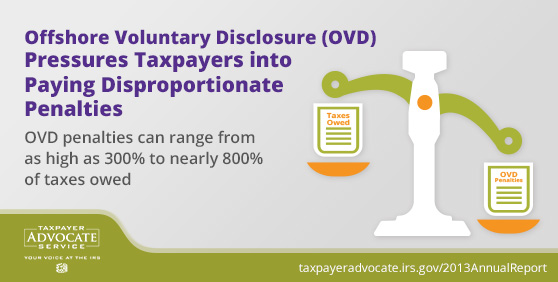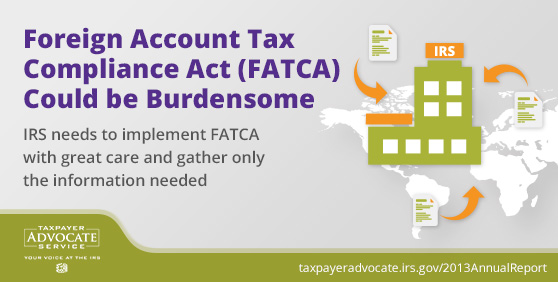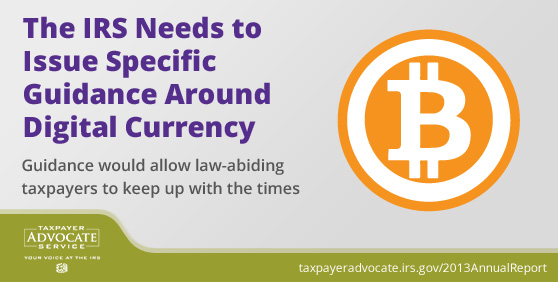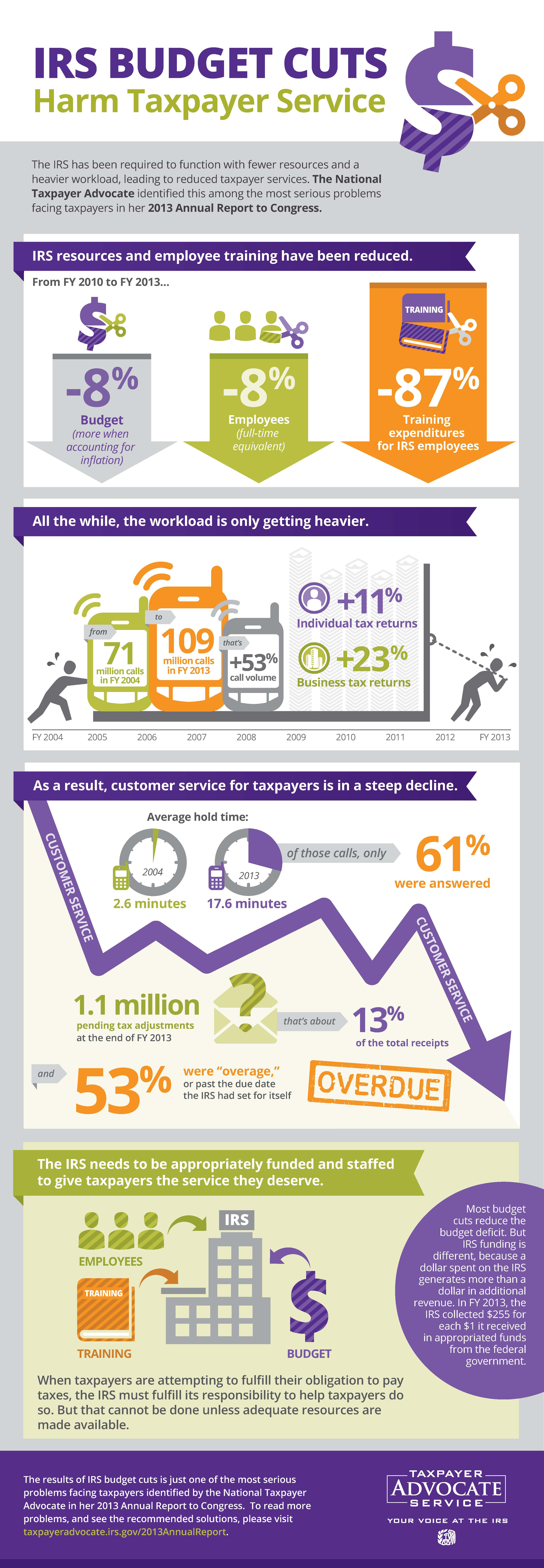
In fiscal terms, the mission of the IRS trumps the missions of all other federal agencies. If the IRS lacks adequate funding to do its job effectively, the government will have fewer dollars to fund federal programs.
Since FY 2010, the IRS’s workload has grown, and its budget has been reduced by 8%. The combination of more work and less funding has predictably impaired the IRS’s performance. Last year, for example, the IRS could only answer 61% of customer service calls, and those who got through had to wait nearly 18 minutes on hold.
The requirement to pay taxes is generally the most significant burden a government imposes on its citizens. The National Taxpayer Advocate believes the government has a practical and a moral obligation to make compliance as simple and painless as possible. The report also presents research studies showing that top-quality taxpayer service has a significant influence on tax compliance.
The IRS is the federal government’s accounts receivable department and generates a substantially positive return on investment. In FY 2013, the IRS collected $255 for each dollar it received in appropriated funds. It is therefore self-defeating to treat the IRS like a pure spending program in which a dollar spent is simply a dollar spent. With the IRS, a dollar spent generates many dollars in additional revenue and thus helps to reduce the budget deficit.
Read the full discussion
“Because the IRS is the federal government’s accounts receivable department and generates a substantially positive return on investment, it is self-defeating to treat the agency like a pure spending program. With most spending programs, a dollar spent is simply a dollar spent from a budget perspective. With the IRS, a dollar spent generates many dollars in additional revenue.”
“
– Nina Olson, National Taxpayer Advocate



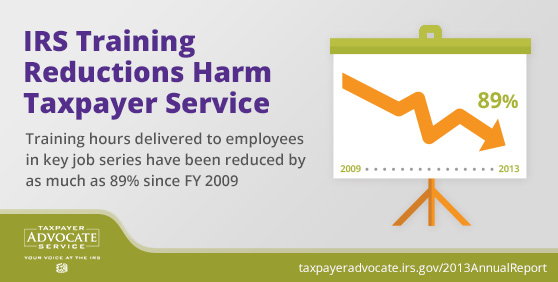 Budget cuts and sequestration have led the IRS to cut its overall training budget by more than 85% and training hours for key employees by up to by 89% since fiscal year 2009. Most of the IRS operations that work directly with taxpayers had their training curtailed even more that the agency as a whole. The IRS has cut its training and education programs to a bare minimum without considering the type of training employees need to perform basic job functions, protect taxpayer rights, and prevent harm and burden for taxpayers.
Budget cuts and sequestration have led the IRS to cut its overall training budget by more than 85% and training hours for key employees by up to by 89% since fiscal year 2009. Most of the IRS operations that work directly with taxpayers had their training curtailed even more that the agency as a whole. The IRS has cut its training and education programs to a bare minimum without considering the type of training employees need to perform basic job functions, protect taxpayer rights, and prevent harm and burden for taxpayers.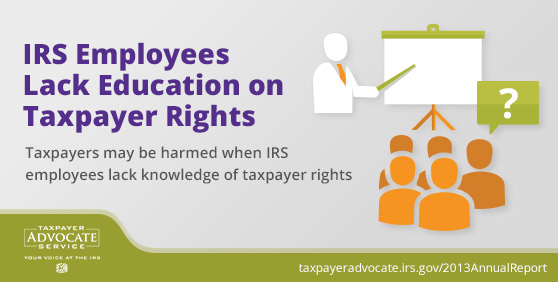 The Internal Revenue Code guarantees taxpayers certain rights. However, many taxpayers are unaware of them, and IRS employees do not always communicate them at the right times. A recent nationwide survey found only 46% of U.S. taxpayers believed they have rights before the IRS, and only 11% knew what those rights were. This lack of awareness is compounded when IRS employees themselves don’t sufficiently understand taxpayer rights.
The Internal Revenue Code guarantees taxpayers certain rights. However, many taxpayers are unaware of them, and IRS employees do not always communicate them at the right times. A recent nationwide survey found only 46% of U.S. taxpayers believed they have rights before the IRS, and only 11% knew what those rights were. This lack of awareness is compounded when IRS employees themselves don’t sufficiently understand taxpayer rights.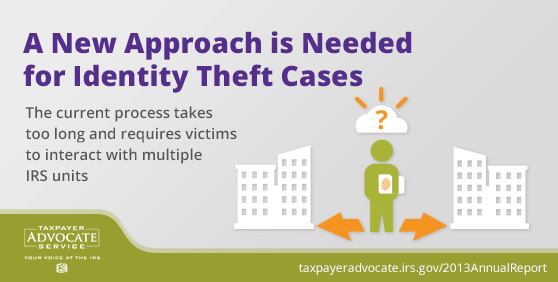 Tax-related identity theft wreaks havoc on the lives of its many victims, who must deal with the IRS for months or years to untangle their account problems. To its credit, the IRS has recognized identity theft as a major challenge, but still takes much too long to fully unwind the harm suffered by identity theft victims and issue refunds to the legitimate taxpayers.
Tax-related identity theft wreaks havoc on the lives of its many victims, who must deal with the IRS for months or years to untangle their account problems. To its credit, the IRS has recognized identity theft as a major challenge, but still takes much too long to fully unwind the harm suffered by identity theft victims and issue refunds to the legitimate taxpayers.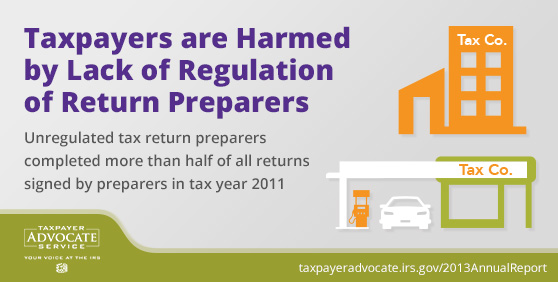 In tax year 2011, 42 million tax returns were prepared by unregulated tax return preparers. Because preparers play a critical role in tax administration, the IRS must ensure that they are competent, visible, and accountable. However, the Taxpayer Advocate Service has witnessed widespread problems with competence and ethical standards in the tax preparation industry.
In tax year 2011, 42 million tax returns were prepared by unregulated tax return preparers. Because preparers play a critical role in tax administration, the IRS must ensure that they are competent, visible, and accountable. However, the Taxpayer Advocate Service has witnessed widespread problems with competence and ethical standards in the tax preparation industry.